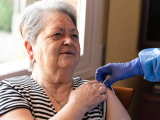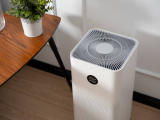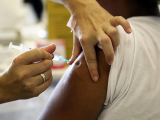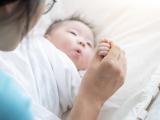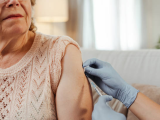Last year was the first time the United States had two approved methods for combating respiratory syncytial virus (RSV) infections in infants, a maternal vaccine administered in the final weeks of pregnancy and the antibody nirsevimab given to infants under the age of 8 months during RSV season.
But In Morbidity and Mortality Weekly Report, authors describe the results of a Centers for Disease Control and Prevention (CDC) survey which shows only 55.8% of infants were protected by maternal RSV vaccine, nirsevimab, or both.
In order to assess the use of maternal vaccine and infant antibodies, CDC conducted a web-based survey from March 26 through April 11, 2024, among women 18 to 49 years who reported being pregnant at any time since August 1, 2023.
The survey included 866 women with an infant born during August 2023 through March 2024; analysis of RSV vaccination coverage was limited to 678 women who were 32 to 36 gestational weeks’ pregnant any time during September 1, 2023, through January 31, 2024.
Nirsevimab coverage among infants as well as proportion of infants protected by either maternal or infant immunization was evaluated among 866 women who had a live birth between August 1, 2023 and March 31, 2024.
Provider recommendation heavily influenced uptake
Maternal RSV vaccination coverage was 32.6%, and of those 54.1% reported receiving the vaccine at an obstetrician or gynecologist’s office. Several factors were associated with maternal vaccine use, the authors said. Uptake was higher among those with private or military insurance (38.9%) than among those with public insurance (28.0%); those living at or above poverty (35.0%) compared with those living below poverty (26.4%); and those with higher than a college degree (50.1%) than among those with a college degree or less (28.7%–32.7%).
Of note, only 1.9% of women who received no medical recommendation received the vaccine, compared to 56.7% of those who relied on a recommendation from a provider.
"Approximately one half of pregnant women did not report receiving a provider recommendation for maternal RSV vaccination or nirsevimab for their infants, indicating missed opportunities to protect infants from severe RSV disease," the authors wrote.
Infant coverage with nirsevimab was 44.6%. Again, use was higher among those who received a provider recommendation for either maternal or infant RSV immunization (58.7%) comparedwith those who did not receive a recommendation (28.3%).
Overall, 55.8% of infants were protected by either maternal RSV vaccination, nirsevimab, or both; 14.2% of infants were protected by both. These numbers were below the projected percentages.
Multiple challenges in rolling out the new immunization products might have resulted in lower than anticipated coverage.
"Multiple challenges in rolling out the new immunization products might have resulted in lower than anticipated coverage," the authors wrote. "These challenges included timing of recommendations and product availability, differing recommendations in terms of timing of vaccine and nirsevimab administration … and concerns about safety and efficacy of the products."
Antiviral treatment shows promising results
In related RSV research, promising results from a phase 3 randomized, placebo-controlled trial conducted in China show ziresovir, a novel antiviral treatment for RSV, significantly reduced viral load and bronchiolitis clinical scores at day 3.
The study, published in the New England Journal of Medicine, included 244 children and infants hospitalized with RSV.
No safety concerns were noted.
"These initial findings warrant further evaluation in an international, phase 3 trial of ziresovir treatment for RSV infection," the authors concluded.

